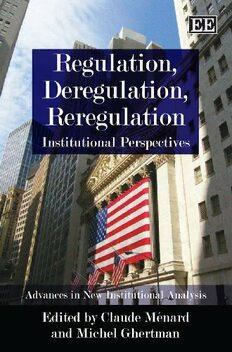
Regulation, Deregulation and Reregulation: Institutional Perspectives (Advances in New Institutional Analysis Series) PDF
404 Pages·2009·2.763 MB·English
Most books are stored in the elastic cloud where traffic is expensive. For this reason, we have a limit on daily download.
Preview Regulation, Deregulation and Reregulation: Institutional Perspectives (Advances in New Institutional Analysis Series)
Description:
In this book, leading scholars explore avenues in the field of regulation opened and developed by Oliver Williamson. Building on his original analysis, the contributors introduce new ideas, different perspectives and provide tools for better understanding changes in the approach to regulation, the reform of public utilities, and the complex problems of governance. They draw largely upon a transaction cost approach, highlighting the challenges faced by major economic sectors and identifying critical flaws in prevailing views on regulation. Deeply rooted in sector analysis, the book conveys a central message of new institutional economics: that theory should be continuously confronted by facts, and reformed or revolutionized accordingly. With its emphasis on the institutional embeddedness of regulatory issues and the problems generated by the 'benign neglect' of institutional factors in the reform of major public utilities, this book will provide a wide-ranging audience with challenging views on the dynamics of regulatory approaches. Economists, political scientists, postgraduate students, researchers and policy-makers with an interest in institutional economics and economic organization will find the book to be a stimulating and enlightening read.
See more
The list of books you might like
Most books are stored in the elastic cloud where traffic is expensive. For this reason, we have a limit on daily download.
